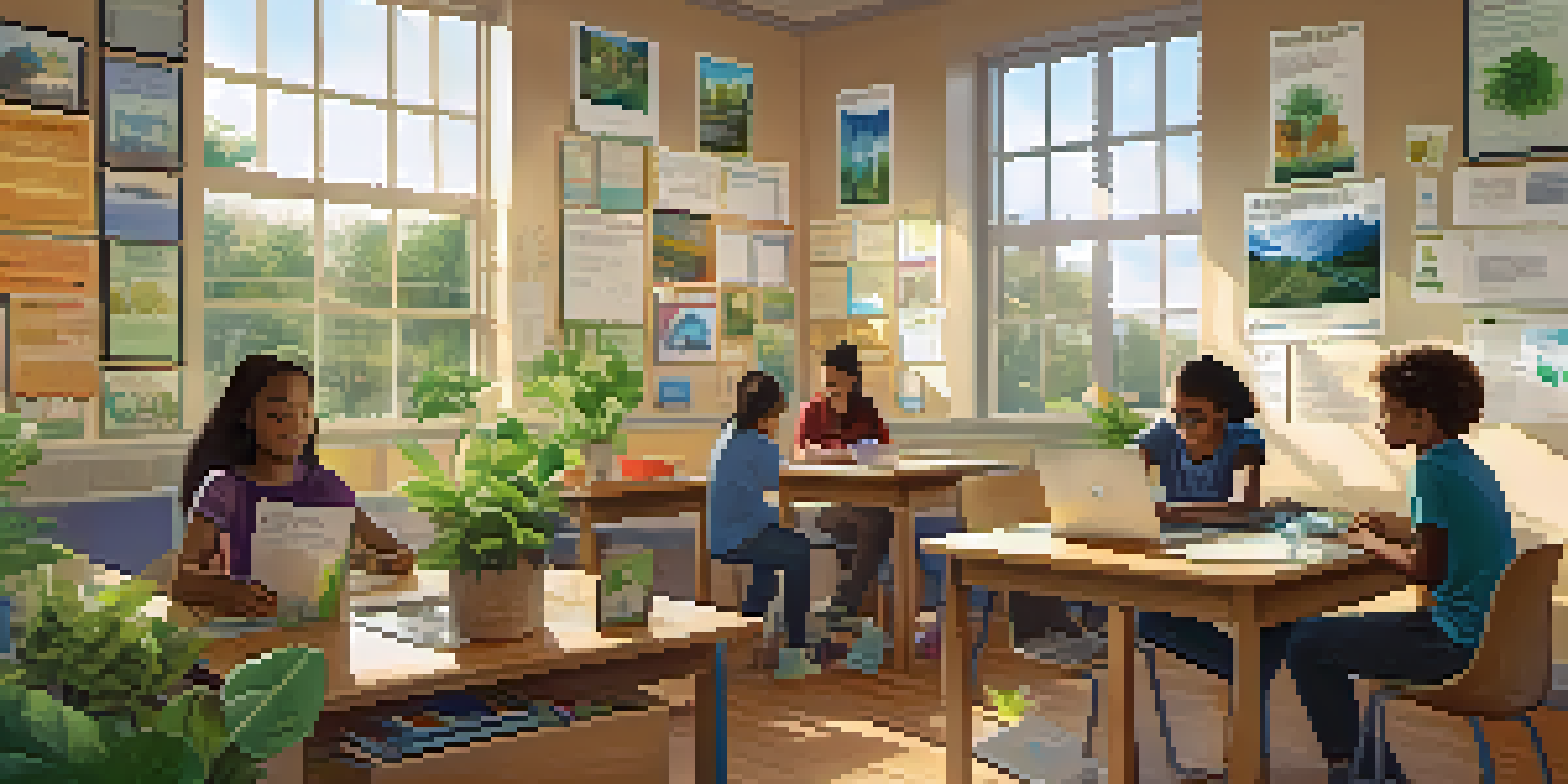Educating for Sustainability: Global Strategies and Goals

Understanding Sustainability Education and Its Importance
Sustainability education aims to equip individuals with the knowledge to create a sustainable future. It encompasses various subjects, from environmental science to economics, and emphasizes the interconnectedness of social and ecological systems. By fostering critical thinking and problem-solving skills, this type of education empowers learners to make informed decisions.
Education is the most powerful weapon which you can use to change the world.
The importance of sustainability education cannot be overstated. It prepares future generations to tackle pressing global challenges like climate change, resource depletion, and social inequality. By understanding these issues, students can become active participants in their communities, advocating for policies that promote sustainability.
Ultimately, sustainability education is not just about knowledge; it's about action. It inspires learners to engage in their communities, whether through local projects or global initiatives, creating a ripple effect that can lead to meaningful change.
Global Goals for Sustainable Development and Education
The United Nations' Sustainable Development Goals (SDGs) provide a framework for global sustainability, with Goal 4 explicitly addressing quality education. This goal emphasizes the need for inclusive and equitable quality education and promotes lifelong learning opportunities for all. It highlights the crucial role education plays in achieving sustainability across various sectors.

These global goals encourage nations to integrate sustainability into their educational systems. This means not only teaching about sustainability but also applying sustainable practices within schools and institutions. By aligning educational curricula with these goals, countries can foster a generation of informed citizens ready to tackle global challenges.
Sustainability Education Empowers Action
By fostering critical thinking and problem-solving skills, sustainability education encourages learners to actively engage in creating a sustainable future.
Moreover, the SDGs serve as a motivator for collaboration among nations. Sharing best practices and strategies for sustainability education can create a united front in the fight against climate change and other pressing issues, ensuring that no one is left behind in this crucial endeavor.
Innovative Teaching Strategies for Sustainability Education
To effectively educate for sustainability, innovative teaching strategies are essential. Project-based learning, for instance, allows students to engage with real-world problems, collaborating on projects that have tangible impacts on their communities. This hands-on approach fosters a deeper understanding of sustainability concepts.
The greatest threat to our planet is the belief that someone else will save it.
Another effective strategy is the use of interdisciplinary learning. By connecting subjects such as science, mathematics, and social studies, educators can provide a more holistic view of sustainability. This helps students see the relevance of sustainability across various contexts, making the learning experience more engaging and impactful.
Additionally, incorporating technology into sustainability education can enhance learning experiences. Online platforms and tools enable students to collaborate globally, share ideas, and explore sustainability initiatives worldwide, broadening their perspectives and inspiring action.
Community Engagement: A Pillar of Sustainability Education
Community engagement is vital for effective sustainability education. When learners participate in local projects, they gain practical experience and a sense of ownership over sustainability initiatives. This connection to the community not only reinforces classroom learning but also builds a culture of sustainability outside school walls.
Moreover, partnerships between schools and local organizations can enrich educational programs. By collaborating with environmental groups, businesses, and government agencies, educators can provide students with access to resources, expertise, and real-world applications of their learning. This collaborative approach enhances the relevance and impact of sustainability education.
Technology Enhances Learning Accessibility
Innovative tools and online platforms democratize sustainability education, making it accessible to learners worldwide and fostering global collaboration.
Finally, community engagement fosters a network of support for sustainability initiatives. When students see their efforts making a difference locally, it motivates them to continue advocating for sustainable practices and inspires others to join the cause, creating a collective movement towards a more sustainable future.
Role of Technology in Advancing Sustainability Education
Technology plays a transformative role in sustainability education by providing innovative tools and resources. Online courses, webinars, and educational apps make sustainability topics accessible to learners worldwide, breaking down geographical barriers. This democratization of knowledge empowers individuals to engage with sustainability issues regardless of their location.
Furthermore, technology facilitates collaboration among students and educators globally. Virtual classrooms and forums allow for discussions and exchanges of ideas on sustainability practices, fostering a sense of global community. This interconnectedness can lead to shared solutions and cooperative efforts across borders, amplifying the impact of sustainability education.
However, it's essential to use technology mindfully. While it can enhance learning, educators must ensure that it complements traditional teaching methods and does not replace in-person engagement and critical thinking. Striking the right balance will lead to more effective and engaging sustainability education.
Measuring the Impact of Sustainability Education
Assessing the effectiveness of sustainability education is crucial for continuous improvement. Various metrics can be used, including student engagement levels, changes in attitudes towards sustainability, and participation in local initiatives. Surveys and reflection exercises can provide valuable insights into how well educational goals are being met.
Moreover, tracking the long-term outcomes of sustainability education can illustrate its impact. For instance, analyzing the involvement of former students in sustainability-related careers or community projects can showcase the effectiveness of educational programs. This data not only helps refine curricula but also advocates for the importance of sustainability education.
Community Engagement Drives Impact
Active participation in local sustainability projects not only reinforces classroom learning but also cultivates a culture of sustainability in the community.
Ultimately, measuring impact is about more than just data; it’s about storytelling. Sharing success stories of students who have made a difference can inspire others and highlight the transformative power of sustainability education.
Future Directions for Sustainability Education
Looking ahead, the future of sustainability education will likely focus on adaptability and resilience. As global challenges evolve, educational programs must be flexible enough to address emerging issues. This adaptability will ensure that learners are equipped with the skills needed to navigate an uncertain future.
Additionally, there will be a growing emphasis on localizing sustainability education. Tailoring programs to fit the specific environmental and cultural contexts of communities can make learning more relevant and impactful. This localized approach helps students understand the unique challenges and opportunities they face, fostering a stronger commitment to sustainability.

Finally, the integration of diverse perspectives will be key. Engaging with indigenous knowledge systems, for example, can provide valuable insights into sustainable practices that have stood the test of time. By embracing a variety of viewpoints, sustainability education can become more inclusive and effective, paving the way for a more sustainable world.